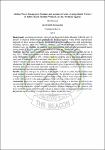| dc.description.abstract | Background: According to research done at Lira Regional Referral Hospital (LRRH), only 56
percent of medical professionals appropriately manage medical waste. If not appropriately
disposed of, these wastes can cause major health risks to health workers and communities,
including injuries, infections, trauma, wounds, and environmental contamination. The
objective was: To examine the medical waste management practices and associated factors
among health workers in public health facilities in Lira City, Northern Uganda.
Methods: This was a cross-sectional study conducted in public health facilities in Lira City in
July, 2023. The study population was health workers and the sample size of 200 was determined
using the Yamane formula (1967). Simple random sampling and a structured questionnaire
were used to collect the data. Data were entered in SPSS version 23 and further analyzed in
STATA version 15 at three levels including univariate (descriptive statistics), bivariate (cross
tabulations X2), and multivariate level (multivariate logistic regression). Ethical approval was
obtained from Lira University Research and Ethics Committee (LUREC) and the ethical
considerations were observed during data collection.
Results: Just over one-quarter (28.5%) of the health workers in public health facilities had
good practices towards medical waste management. The predictors of good medical waste
management practices included having knowledge about medical waste disposal (AOR=1.53,
p=0.021, 95% CI 0.44-5.4), and occupation (AOR=2.757, p=0.04, CI 0.94-4.12)
Conclusion: There are poor medical waste management practices in facilities in Lira City. We
recommend that the government of Uganda should provide enough supplies to the facilities,
City Health Authorities should conduct continuous medical education for the workers, and
there should be supervision of health workers to ensure proper management of medical waste.
Keywords: Medical Waste, Health Workers, Public Health Facilities | en_US |

